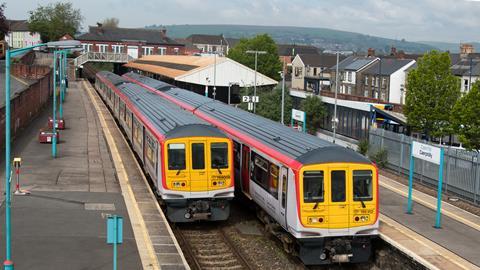UK: Transport for Wales updates Rail Business UK on progress with its rolling stock renewal programme.
Welsh government-managed operator Transport for Wales Rail is in the process of introducing three types of new-build rolling stock plus two refurbished or rebuilt fleets as its complex rolling stock renewal programme gathers pace.
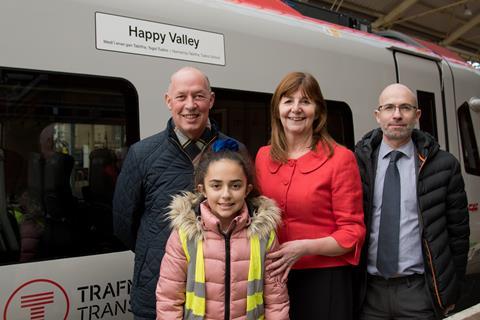
Celebrations in Llandudno in late January marked the formal launch of the CAF Class 197 DMU fleet, although the first trains carried passengers on the Conwy Valley line to Blaenau Ffestiniog on November 14. Also newly entering traffic are the Class 231 Stadler Flirt DMUs being supplied by Stadler for routes in South Wales, while ex-LNER MkIV push-pull sets now being rolled out on the Manchester – Cardiff route will augment TfW Rail’s existing loco-hauled trains.
On the horizon is the entry into service of tri-mode Flirts on the Core Valleys network, and the reactivation of a project to introduce Vivarail Class 230 diesel-battery trains on the Wrexham – Bidston Borderlands line.
Class 197 progress
Speaking at the ceremonial launch of the Class 197 DMU fleet at Llandudno on January 26, Transport for Wales Chief Executive James Price said their squadron entry into service was a ‘landmark day because these units will be in passenger service certainly in Wales for 15 to 20 years, maybe longer, but they’ll be in the UK maybe for 40 years’.
The 51 two-car and 26 three-car DMUs are being manufactured by CAF at its Newport facility. CAF UK Business Development Director Richard Garner said it was a proud day for the company, adding that the contract had been ‘quite a journey’ with ‘a few problems to solve’. Nevertheless, CAF is proud of what Garner saw as a specifically Welsh project. ‘Over the last few years in Wales we’ve employed over 250 people to manufacture these trains with far more in the supply chain’, he noted.
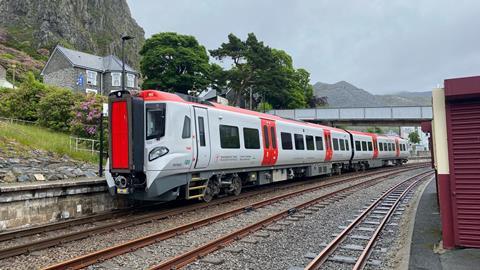
CAF has an initial 10-year maintenance services contract for the Class 197 fleet. This will be managed from Chester depot, which the Spanish supplier took over from Alstom in June 2022. The transition included taking on the maintenance of the 27 Class 175 DMUs which the 197s will replace over the next year; the first of the Alstom Coradia DMUs are due to go off lease in Q1 as more CAF sets enter service.
Chester depot itself is being completely refurbished so that more work can be taken in-house by CAF, including bogie and engine overhaul. A subfleet of 21 ETCS-equipped Class 197s that will work on the Cambrian Coast line will be serviced at Machynlleth depot, only returning to Chester for heavier work. Remote monitoring of the Class 197s will use CAF’s LeadMind Digital Train Platform so that potential faults or maintenance interventions can be identified in a preventative approach.
‘The rollout of the 197s is catching up after a slow start; we are hoping that CAF can get up to a delivery rate of about one set per week’, TfW Rail Managing Director Jan Chaudhry-van der Velde told Rail Business UK at the event in Llandudno.
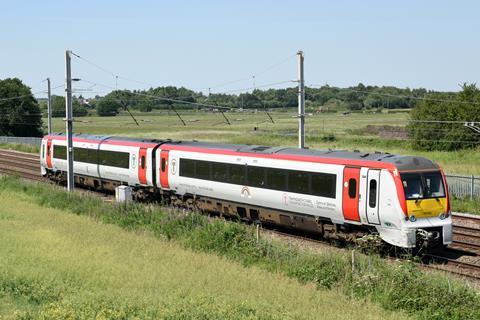
Issues to resolve have included the functioning of the Selective Door Opening system, vital given that there are many short platforms on routes where the Class 197s are to be deployed.
‘Some units have taken longer to get through their fault-free running than we thought; we’ve been absolutely determined in our acceptance team to make sure that we’re confident that they are properly shaken down before we accept them’, Chaudhry-van der Velde explained. He noted that TfW Rail had benefitted from lessons learned by Northern when commissioning its CAF Class 195 DMUs, which are mechanically similar. ‘The rollout will then be determined by how quickly we can train the conductors and drivers’, he added. With most of North Wales done, training of Cardiff-based crews is expected to start this month.
The introduction of the Cambrian subfleet is expected to pose a delicate technical challenge. Currently, these services are worked by a dedicated pool of Class 158 DMUs, but the Cambrian ETCS has suffered from mixed reliability since Network Rail’s Early Deployment Scheme went live in 2010. A recent upgrade of the lineside ETCS equipment to the SRS 2.3.0d specification should help TfW Rail and CAF to introduce the new trains on the route in a more reliable manner, the operator hopes. The Class 197s are fitted with ETCS Baseline 3 onboard units which are backwards compatible with 2.3.0d.
Other Cambrian challenges include the complexity of managing onboard information provision in both English and Welsh on a route with a large number of intermediate stations, and assessing how four-car formations can be reintroduced between Dovey Junction and Pwllheli. Short platforms and level crossing positioning issues mean that two-car DMUs are the longest trains used at present, but TfW Rail acknowledges that this is unlikely to be sufficient for the busy summer season. However, an hourly service is expected to be offered west of Shrewsbury to mitigate some of these challenges.
Class 231 launched
Turning to South Wales, the soft introduction of the first of 11 four-car Stadler Flirt diesel multiple-units between Cardiff and Rhymney from January 18 has seen good reliability, according to Chaudhry-van der Velde.
These Class 231 DEMUs will ultimately be used on trains to Maesteg, Ebbw Vale, Gloucester and Cheltenham Spa, but ‘because they are front-ended in the manufacturing process, rather than just having them in storage, we decided to make a head start on driver and conductor training and use them on the Rhymney line, where they are route cleared’, he explained.
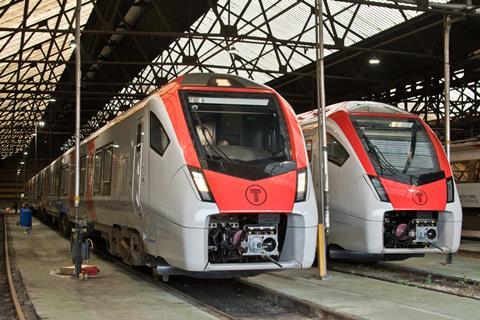
Their introduction will allow TfW Rail to replace the Class 769 trainsets currently being used on the Rhymney service. These former Class 319 EMUs were converted for diesel operation as a lower-cost option for rolling stock cascades, but like similar ‘Flex’ trains taken on by Northern and Great Western Railway, they have proved very unreliable. TfW’s eight Class 769 trains are currently recording the worst distance per fault statistics in the industry, and TfW Rail hopes to be able to withdraw them all by the May 2023 timetable change.
‘This means we’ll be able to get the Valley Lines drivers and conductors trained on the Class 231s ahead of the introduction of the Class 756 electro-diesel-battery Flirt sets, the first of which has been delivered to [Cardiff] Canton depot’, Chaudhry-van der Velde continued. ‘Although they’re not identical, the conversion course will be much shorter than training on new traction.’
Locos on the Marches
TfW Rail and the preceding Arriva Trains Wales business have for many years operated small numbers of premium services between Cardiff and Holyhead using diesel loco-hauled formations. But policymakers’ aspirations to upgrade the Cardiff – Manchester service to inter-city standards have led to the current operator taking on several sets of refurbished ex-LNER and Grand Central MkIV coaches.
Several of these have been bought outright by the Welsh government following the collapse of GC’s plan to use them on open access services between London and Blackpool. They are being used in push-pull mode, with Driving Van Trailers and Class 67 locos leased from DB Cargo.
To address long-standing capacity constraints on the Marches line, TfW Rail is aiming to introduce seven five-car rakes of MkIV coaches. However, the roll-out of the first few sets since December has not gone smoothly for a variety of reasons, Chaudhry-van der Velde reported. ‘A lot of the problems we are having is with the interface between the Class 67 locomotives and the coaches and DVTs. They weren’t designed to work with the 67s, they were designed to work with Class 91s and so we’ve had to do a lot of modifications to a small pool of 67s owned by DB Cargo. We’ve also fitted Selective Door Opening to all of the rakes, with the last couple being completed at Landore depot in Swansea at the moment.’
The sets are currently operating as four-car formations, but as reliability improves TfW Rail expects to add the fifth vehicle. This would add approximately 100 seats per formation on one of its busiest routes; the operator plans to complement the MkIV sets with five-car Class 197 formations on the hourly Cardiff – Manchester service in the medium term.
TfW Rail says that these five-car DMUs will include a ‘standard plus’ seating section; destinations west of Swansea will retain through services to and from Manchester using two-car Class 197 portions which will join and split at Swansea.
Class 230 hope
Like several other operators, TfW Rail’s plans have been disrupted by the collapse of Vivarail into administration in December last year.
The operator had intended to introduce five Class 230 diesel-battery trainsets converted from ex-London Underground D78 stock on the Borderlands Line linking Bidston near Birkenhead with Wrexham. Already significantly delayed, the project has been formally paused by TfW following a number of commissioning problems, including two cases of fires breaking out on the vehicles.
Nevertheless, the operator is keen to try to reanimate the roll-out, not least because the Borderlands fleet has been purchased outright by the Welsh government, and there is a desire not to write off taxpayers’ investment. However, a number of reliability and design ‘root problems’ will need to be addressed before driver training can resume on the route, TfW says.
A further complication has arisen from a decision on capacity allocation on the Borderlands line by the Office of Rail & Road, which was asked to adjudicate between TfW Rail’s timetable goals and the needs of freight operators serving industrial sites along the route. The result is that the passenger service moving forward will be a mix of all-stations and ‘skip stop’ trains giving two trains per hour from end to end, but the resulting fleet diagrams may require a different performance profile than had been assumed when the Class 230s were procured.
Chaudhry-van der Velde explained that that Class 230s are unlikely to be robust enough to fulfil all these diagrams, so the operator is assessing whether Class 197s could fill in on the ‘skip stop’ workings to deliver a more reliable service.
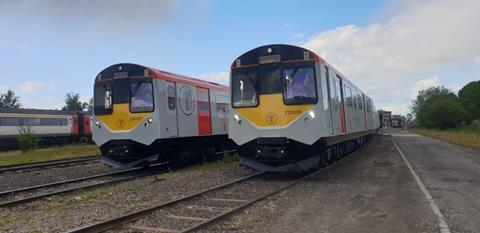
Pandemic recovery
More positively, Chaudhry-van der Velde told Rail Business UK that TfW Rail has ‘been recovering from the pandemic at a slightly faster rate than the industry averages, although the last eight weeks [from the start of December] has been really rough because passenger confidence has drained away with all the disruption caused by the strikes’.
The TfW network has suffered ‘particularly badly’ during industrial action by RMT signallers and maintenance workers ‘because of the number of remote signal boxes on many of our routes. Many routes are not open during the strikes even though all our drivers, conductors and station staff as well as controllers and technicians are working normally’, he emphasised.

